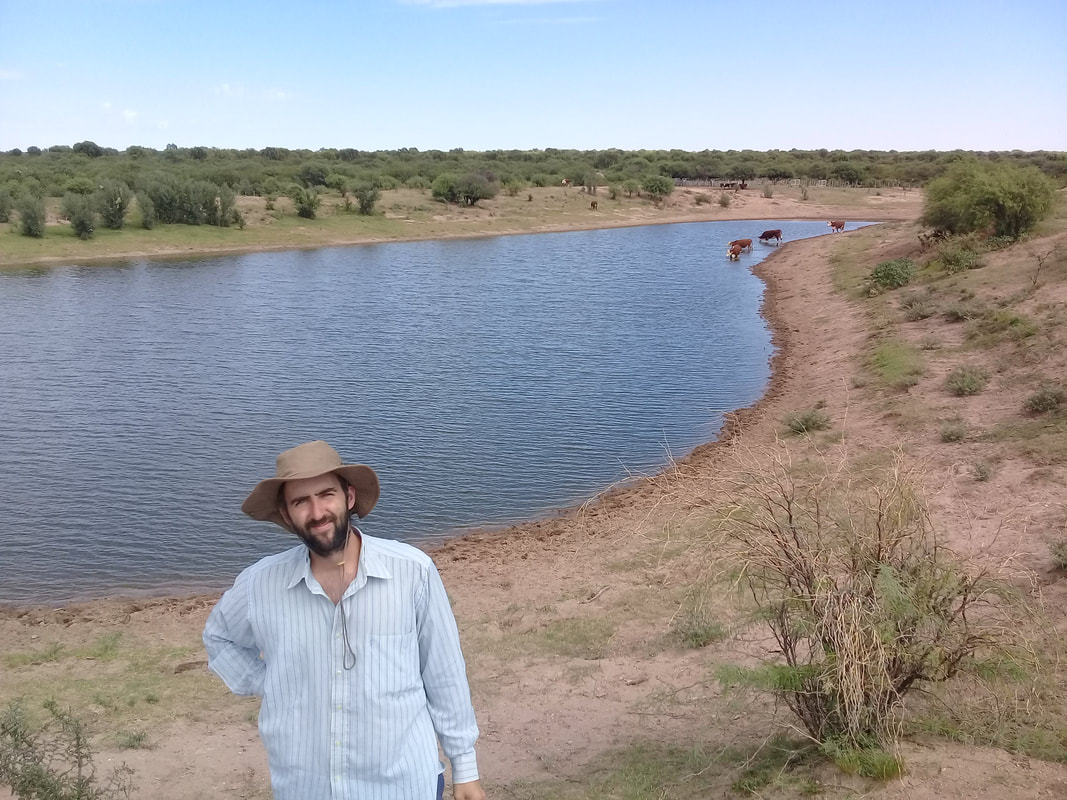Ecohydrology is an amazing discipline that studies the relations between vegetation dynamics and the water cycle in human-domain environments. Although ecohydrology comprises very different situations, I especially focus on water-limited environments (drylands). Drylands have the particularity that carbon and water cycles are highly coupled and the interventions made by humans (e.g. land use/cover change, livestock intensification) have large, sometimes not reversible, impacts.
What are your undergraduate and graduate degrees in?
My undergraduate degree is in Agronomy from the University of Buenos Aires, Argentina. Then, I made my Ph.D. entitled “Surface dynamics of water in semi-arid plains: the role of rainfall and vegetation cover” at the same university.
How did you arrive at working in/thinking about ecohydrology?
When I finished my undergraduate career, I moved from Buenos Aires city to San Luis city to start my Ph.D. San Luis is a quite small city located in the middle of native dry forests (Dry Chaco ecoregion) that were been converted rapidly and massively into pastures and rainfed croplands. In my first’s field trips, I watched how land cover change and other human decisions transform the ecosystems largely changing water dynamics. To see this by my own eyes, and the company of different scientists of the “Environmental Studies Group” that were trying to understand them, were the main motivations to work in ecohydrology.
What do you see as an important emerging area of ecohydrology?
For sure, “rainwater harvesting” is a very important area where scientists have a lot to do. Rainwater harvesting has been essential for the establishment of human settlements in many drylands of the world that lacked suitable surface or groundwater resources. First experiences data from 3000 years B.C. Nowadays, most of the drylands of the world depend on limited rainfall inputs to generate primary and secondary production, but in some areas, people developed different techniques to harvest a small proportion of rainfall, store it in small dams, and use it to produce small farms or to water supply for livestock. A small amount of water in a dry site can make possible human life and production without generating regional undesirable consequences. To understand the ecohydrological relations between rainfall, soil, vegetation and human behaviors is the first step to improve rainwater harvesting systems.
Do you have a favorite ecohydrology paper? Describe/explain.
Yes, I like very much “Vegetation patches and runoff erosion as interacting ecohydrological processes in semiarid landscapes” from Ludwig et al. (2005). This paper explains the relations between rainfall-runoff processes and vegetation growth at small scales (e.g. patches of 1 m2). Runoff was always considered as an unproductive flux in drylands because represents a fraction of rainfall that cannot be transpired by vegetation. This paper shows that runoff of a bare soil patch can be captured by a vegetated patch enhancing vegetation production at the stand scale (100 ha). This is a mechanism that drylands have to be more efficient at using the limited water of rainfall.
What do you do for fun (apart from ecohydrology)?
I like fishing, going for walks, making gardens and playing soccer with my children. I also enjoy watching soccer on the TV (San Lorenzo is my favorite team) and listening to music particularly national rock such as “Los fundamentalistas del aire acondicionado” or “Divididos”.

 RSS Feed
RSS Feed